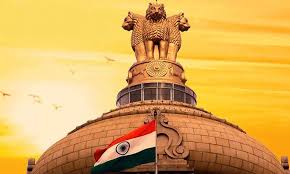Ahmedabad
(Head Office)Address : 506, 3rd EYE THREE (III), Opp. Induben Khakhrawala, Girish Cold Drink Cross Road, CG Road, Navrangpura, Ahmedabad, 380009.
Mobile : 8469231587 / 9586028957
Telephone : 079-40098991
E-mail: dics.upsc@gmail.com

News: Recently, the Supreme Court said that governors should clear bills passed by the legislative assemblies as soon as possible, as required under Article 200 of the Indian Constitution.
The plea in the Supreme court was filed by the Telangana government seeking directions to the governor to clear ten bills passed by the state Assembly.
→ It gives governors the power to either grant assent to a bill, withhold assent or reserve the bill for the president’s consideration in certain cases.
→ The governor may return the bill (if it is not a Money Bill) requesting the House/Houses to reconsider the bill.
.jpeg)
While referring to the first provision to Article 200 of the Constitution, the SC mandated that Governors should not delay over Bills sent to them for assent after they had been passed by Legislative Assemblies. They should be returned 'as soon as possible'. The expression 'as soon as possible' in this article has significant constitutional intent and that constitutional authorities should keep this in mind.
→ In Kerala, the Governor publicly announced that he would not give assent to the Lokayukta Amendment Bill and the Kerala University Amendment Bill.
→ In a new constitutional development, the TN Assembly passed a resolution urging the President of India to fix a timeline for assent to be given to bills passed by the Assembly.
→ Article 355 of the Constitution says that it shall be the duty of the Union to ensure that the government of every State is carried on in accordance with the Constitution. This provision justifies the “invasion of the provincial field” by the Union government and the proclamation of the President’s rule (under Article 356) in a State.
→ If the governor violates Article 200 and sits on the bills indefinitely (an option not given by the Constitution), the governor is creating a situation where governance of the state cannot be carried on in accordance with the Constitution.
→ In such a situation, the government of the State has a constitutional duty to invoke Article 355 and request the President to give suitable instructions to the Governor.
→ In the United States, the President can refuse assent to a Bill, but if the Houses pass it again with two thirds of each House, the Bill becomes law.
→ In United Kingdom, the veto could only be exercised on ministerial advice. Refusal of royal assent on the ground that the monarch strongly disapproves of a bill/ it was intensely controversial would be unconstitutional.
→ The Founding fathers of constitution couldn’t have visualized that the Governor would be sitting on bills indefinitely without taking any action under Article 200.
→ The current issue requires a different framework within the ambit of the Constitution. Thus, The Supreme Court should set a reasonable time frame for Governors to act on a Bill passed by the Assembly in the interest of federalism in the country.

Address : 506, 3rd EYE THREE (III), Opp. Induben Khakhrawala, Girish Cold Drink Cross Road, CG Road, Navrangpura, Ahmedabad, 380009.
Mobile : 8469231587 / 9586028957
Telephone : 079-40098991
E-mail: dics.upsc@gmail.com
Address: A-306, The Landmark, Urjanagar-1, Opp. Spicy Street, Kudasan – Por Road, Kudasan, Gandhinagar – 382421
Mobile : 9723832444 / 9723932444
E-mail: dics.gnagar@gmail.com
Address: 2nd Floor, 9 Shivali Society, L&T Circle, opp. Ratri Bazar, Karelibaugh, Vadodara, 390018
Mobile : 9725692037 / 9725692054
E-mail: dics.vadodara@gmail.com
Address: 403, Raj Victoria, Opp. Pal Walkway, Near Galaxy Circle, Pal, Surat-394510
Mobile : 8401031583 / 8401031587
E-mail: dics.surat@gmail.com
Address: 303,305 K 158 Complex Above Magson, Sindhubhavan Road Ahmedabad-380059
Mobile : 9974751177 / 8469231587
E-mail: dicssbr@gmail.com
Address: 57/17, 2nd Floor, Old Rajinder Nagar Market, Bada Bazaar Marg, Delhi-60
Mobile : 9104830862 / 9104830865
E-mail: dics.newdelhi@gmail.com